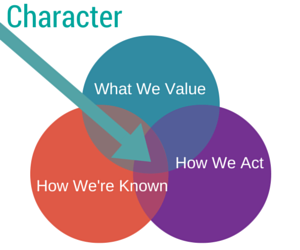Modeling the Way
Their Eyes Are On You – Are You OK With What They See?
I have a toddler and an infant at home. I like to think I’m an “aware” parent who is careful to demonstrate the behavior I expect from each of them. However, I’m often surprised at what they actually see and pay attention to. It isn’t always what I thought.
The people we lead are similar. They are watching us. I like to think I’m an “aware” leader. However, I’m still regularly surprised at what people notice about me and how they are influenced. Often times, it’s more about how I did something than what I did. What I do matters; but people pay more attention to how I do it.
Even though I focus on making an intentional impact and accomplishing results, I can’t always control those results. However, I can control how I go about it. I can’t control if people are influenced; but, I know they are. So, I focus on how they might be influenced.
Here are three areas where you are being watched. Those who watch you are adapting their behavior based on what they see:
Character: Character is a combination of what we value, how we act and how we’re known. It is essentially the meeting place of those three ingredients. It’s easy to pay the greatest amount of attention to our reputation; or how we’re known. However, we actually have the least amount of control over reputation. We should, instead, reflect on our actual core values and how our choices and behaviors flow from them.
 Many people’s core values are hidden from them. When I do “values exercises” with leaders they invariably cite: service, people, honesty, hard work, etc. as their core values. The truth is, we all have hidden values that motivate us, as well. Examples of hidden core values might include: profits, staying in control, being respected. If our hidden core values are given higher priority in our leadership, evidence of this will leak out.
Many people’s core values are hidden from them. When I do “values exercises” with leaders they invariably cite: service, people, honesty, hard work, etc. as their core values. The truth is, we all have hidden values that motivate us, as well. Examples of hidden core values might include: profits, staying in control, being respected. If our hidden core values are given higher priority in our leadership, evidence of this will leak out.
What are your core values? How are these demonstrated during times of great stress, uncertainty or opportunity? What impact does this seem to have on others?
Performance: By performance I mean three things: First, hard work. Second, the right work. Third, quality work. High performing leaders work hard, focus on the right priorities and offer a good product or service. They accomplish a lot and are, likely, surrounded by others who demonstrate similar traits. High performing leaders attract high performers; but also demonstrate how to improve performance.
Of the three – which is your greatest strength? Being a hard worker? Identifying and staying focused on priorities? Being skillful in the service you provide? How do your strengths impact the performance of others? How would you like to grow?
Attitude: Think of a vibrant, energetic, thriving work environment. Is it led by a pessimist who is negative and critical towards others? Not likely. Our attitude impacts those around us. Practicing gratefulness, being encouraging, and having a belief in the ability to create a better future are critically important attitudes.
Which attitudes do you believe best described you? How do those attitudes impact those around you?
Consistent, regular attention paid to building and shaping our character, performance and attitude will model the way for others. It is the foundation for leading well.
Categories
Get Christian’s Newest Book: Train to Lead

Download my free 10-page eBook:
How To Accomplish More Without Doing More:
Eight Proven Strategies To Change Your Life
Discover how to save eight hours during your workweek-even if you're too busy to even think about it. The resource every maxed out executive needs.